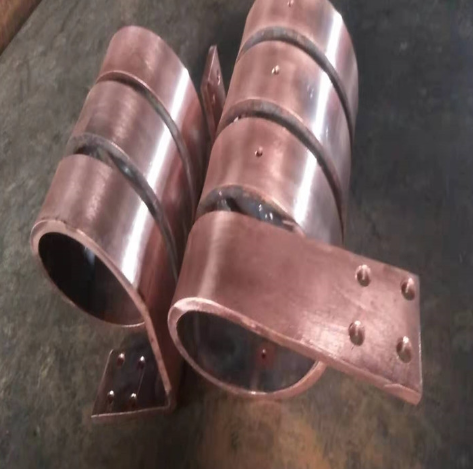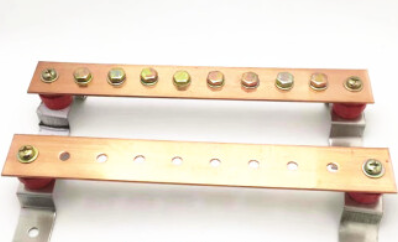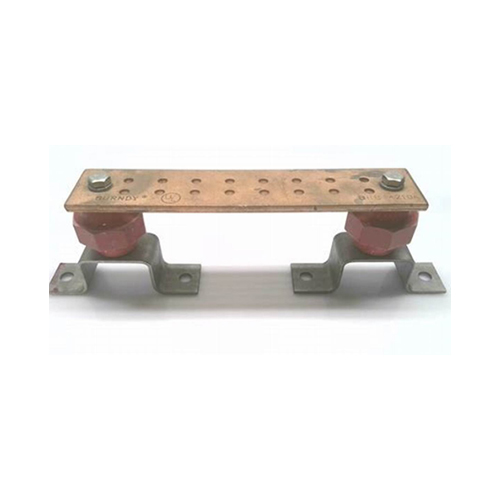Product Details
Grounding copper bars are solid bars made from high-quality copper that are specifically designed for electrical grounding applications. Here are some key product details and characteristics of grounding copper bars:
-
Material: Grounding copper bars are typically made from high-conductivity copper, such as electrolytic tough pitch (ETP) copper or oxygen-free (OF) copper. These copper alloys offer excellent electrical conductivity and corrosion resistance.
-
Shape and Dimensions: Grounding copper bars are commonly available in rectangular or square shapes. The dimensions of the bars can vary, including width, thickness, and length, depending on the specific application and current-carrying requirements.
-
Conductivity: Copper is one of the most conductive metals, offering low resistance to electrical current flow. Grounding copper bars provide an efficient path for the dissipation of electrical charges and the safe transfer of fault currents.
-
Surface Treatment: Grounding copper bars may have a surface treatment or coating to enhance their corrosion resistance or improve their electrical connections. Common surface treatments include tin plating, nickel plating, or silver plating.
-
Mounting Options: Grounding copper bars often feature mounting holes or slots for easy installation. These mounting options allow for secure connections to other grounding components, such as conductors, clamps, or busbar systems.
-
Compliance with Standards: Grounding copper bars may conform to specific standards or regulations, such as those set by the National Electrical Code (NEC) or international standards like IEC (International Electrotechnical Commission).
Grounding copper bars are widely used in various electrical grounding applications, including power distribution systems, electrical panels, substations, telecommunications, and industrial equipment. They provide a reliable and low-resistance path for fault currents, help protect against electrical hazards, and ensure electrical system stability.
When considering grounding copper bars, it is important to specify the desired dimensions, surface treatment, and any applicable standards or regulations. Consulting with reputable manufacturers or suppliers specializing in grounding products can help you obtain accurate product details, technical specifications, and pricing information based on your specific requirements.
Product Features
Grounding copper bars possess several key characteristics that make them suitable for electrical grounding applications. Here are some important characteristics of grounding copper bars:
-
High Electrical Conductivity: Copper is known for its excellent electrical conductivity, making copper bars an ideal choice for grounding applications. The high conductivity of copper ensures low resistance and efficient dissipation of electrical charges and fault currents.
-
Corrosion Resistance: Copper exhibits excellent corrosion resistance, allowing grounding copper bars to withstand harsh environmental conditions and maintain their performance over time. This resistance helps ensure the longevity and reliability of the grounding system.
-
Mechanical Strength: Grounding copper bars are typically manufactured to have sufficient mechanical strength to withstand the mechanical stresses associated with installation, operation, and potential fault currents. They offer good rigidity and stability, maintaining the integrity of the grounding system.
-
Thermal Conductivity: Copper has high thermal conductivity, which is beneficial in grounding applications. It allows for efficient dissipation of heat generated during fault conditions, preventing overheating and potential damage to electrical components.
-
Easy Installation: Grounding copper bars often feature pre-drilled holes or slots for easy installation and connection to other grounding components, such as conductors, clamps, or busbars. This design facilitates efficient and secure grounding system assembly.
-
Compatibility: Grounding copper bars are compatible with various grounding systems, including power distribution systems, electrical panels, substations, and industrial equipment. They can be used in both residential and commercial applications.
-
Standards Compliance: Grounding copper bars can conform to specific industry standards and regulations, ensuring their performance and safety. Compliance with standards such as the National Electrical Code (NEC) or international standards like IEC (International Electrotechnical Commission) ensures that grounding systems meet required specifications and guidelines.
It is important to consider these characteristics when selecting grounding copper bars for a particular application. Manufacturers and suppliers specializing in grounding products can provide detailed information on the specific characteristics, technical specifications, and performance ratings of their grounding copper bars.


 English
English  Español
Español  Português
Português  русский
русский  français
français  日本語
日本語  Deutsch
Deutsch  Tiếng Việt
Tiếng Việt  Italiano
Italiano  Nederlands
Nederlands  ไทย
ไทย  Polski
Polski  한국어
한국어  Svenska
Svenska  magyar
magyar  Malay
Malay  বাংলা
বাংলা  Dansk
Dansk  Suomi
Suomi  हिन्दी
हिन्दी  Pilipino
Pilipino  Türk
Türk  Gaeilge
Gaeilge  عربى
عربى  norsk
norsk  اردو
اردو  čeština
čeština  Ελληνικά
Ελληνικά  Українська
Українська  Javanese
Javanese  فارسی
فارسی  தமிழ்
தமிழ்  తెలుగు
తెలుగు  नेपाली
नेपाली  Burmese
Burmese  ລາວ
ລາວ  Қазақ
Қазақ  Euskal
Euskal  slovenský
slovenský  Македонски
Македонски  Română
Română  Српски
Српски  简体中文
简体中文  Afrikaans
Afrikaans  עִברִית
עִברִית  יידיש
יידיש  Беларус
Беларус  മലയാളം
മലയാളം  Hawaiian
Hawaiian  հայերեն
հայերեն 
















